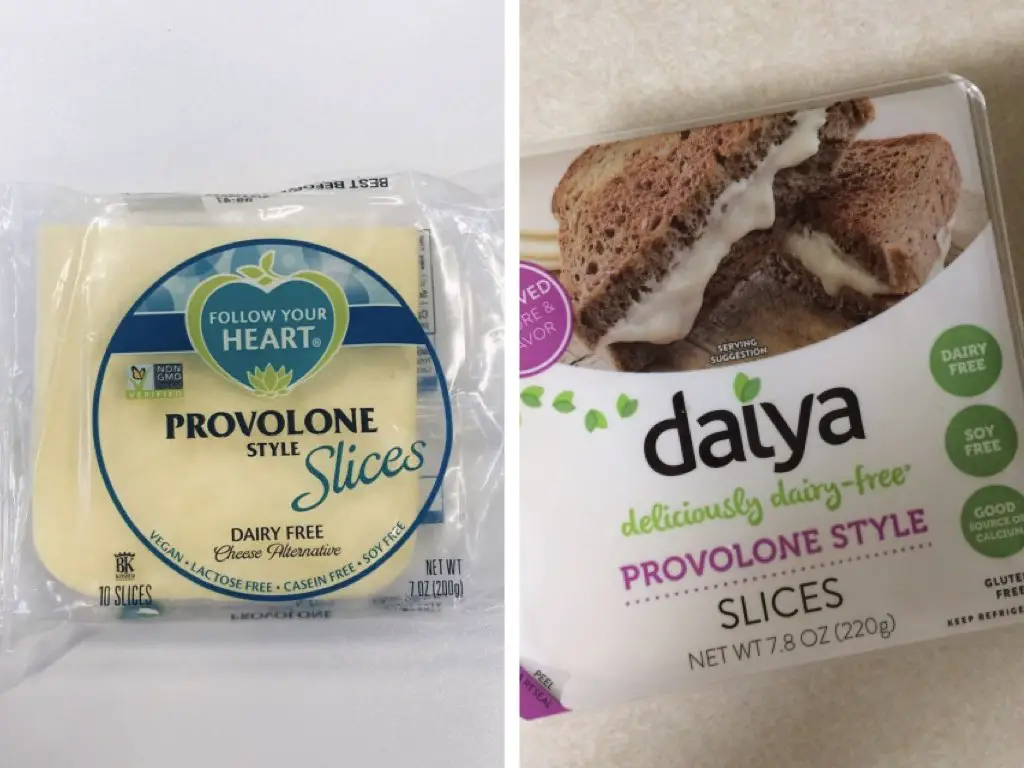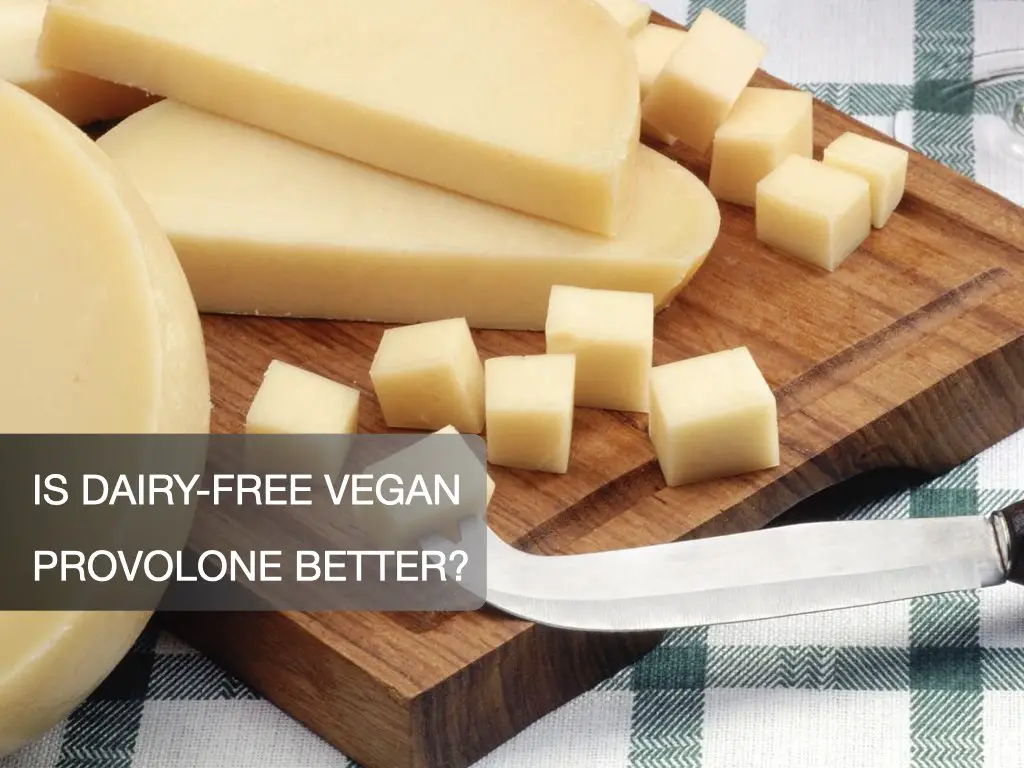Is Dairy-free and Vegan Provolone Better for You?
Did you know that food allergies affect about 24 million people in the United States?
Yes, as scary as it sounds, a fair percentage of world’s population is susceptible to develop a serious immune reaction in response to certain foods.
In fact, the global prevalence of food allergies is 5- 10% that corresponds to about 220 to 520 million people.
It has been suggested that dairy allergies are among the top 8 food allergies in the world.
So, if you are a cheese lover, what are your options? Are there any cheese varieties that are safe for you? Should you consider dairy-free cheese?
Let’s dive deep and explore what are your options if you are allergic to dairy products.
Is Provolone Dairy Free?
Provolone is not dairy free and it’s made of full fat cow’s milk. It has low lactose content compared to several other cheese varieties (such as fresh cottage cheese or mozzarella); due to ripening and aging processes.
Moreover, when whey (the liquid part of curd) is discarded, most whey protein is discarded, milk casein is still present.
This property makes it is a preferred choice for individuals with mild lactose or whey intolerance.
But nonetheless, regular provolone is considered a dairy product and individuals with some allergy to dairy ingredients (such as lactose, casein or whey) should consider dairy free provolone options.
Who should consider dairy free varieties of Provolone cheese?
Anyone can try out the dairy-free variety by choice but there are some individuals who try it because there is no better alternative. These groups are
Susceptible Children:
According to a new study, the prevalence of milk allergy is highest in white Caucasian children (about 55%); with other races also being affected:
- Hispanic children: 19.8%
- African American Children: 16.6%
- Asian Children: 4.6%
It is noteworthy though that most cases of dairy allergy in kids improve when they turn 3-5 years old.
Adults:
- It is also estimated that about 65% adults globally have some degree of milk intolerance or allergy to milk and other dairy products as gut stops producing lactase enzyme (that is responsible for digestion of lactose – the milk sugar).
- Some adults develop temporary dairy allergy after bacterial illnesses involving gut.
How is Dairy Free Provolone different from Regular Provolone Cheese?
Provolone has a peculiar taste, texture and flavor profile which makes it that much harder to replace in the recipes.
Dairy cheeses are made up of milk (cow, goat etc.) vs. non-dairy cheeses are made up of:
- Plant milk (coconut milk)
- Nuts such as almond, pine nuts, cashews
- Plant seeds such as sunflower seeds, sesame seeds
- Plant oils (coconut oil, peanuts, soybeans
- Rice
If you review commercial brands of non-dairy cheese, you will notice that some non-dairy provolone may taste good but does not melt.
The ones that melt, does not stretch like dairy provolone.

What are some known brands and options to consider?
There are a number of vegan or non-dairy provolone cheese varieties that are commercially available.
In fact, some of the varieties tastes just like regular provolone in terms of texture and taste. Following are some notable Vegan Provolone brands that you should give a try if for some reason you cannot enjoy regular provolone.
- Follow Your Heart: It is a well-known, well-reputed brand that produces many other varieties of non-dairy vegan cheeses besides provolone. Reviewers rated this product top notch in terms of creamy texture that melts just like regular provolone.
- Daiya: This is another known brand that promises deliciousness with great texture and melt and stretching. Like Follow your Heart, Daiya provolone cheese is also made up of potato starch coconut oil, fruit and vegetable flavors and colors.
Can you make Dairy Free Provolone at Home?
If you are vegan, you should try this recipe below to make dairy free Coconut Milk Provolone at home, or the regular homemade provolone here.
Coconut milk is preferred over other plant-based milks as it gives your cheese the same creamy and rich texture as regular provolone.
Ingredients:
Coconut Milk: 1 can (full fat)
Nutritional Yeast – 1 tbsp for cheesy flavor
Agar-agar – 2 tbsp the vegan gelatin to give your cheese a firm feel
Lemon Juice – few drops
Salt – 1 tbsp for taste
Tapioca flour – 1 tsp (to give your cheese a little stretchy feel, leave it out if you want firmer cheese)
Water – ½ cup to get the right consistency
Method: Put all the ingredients in a saucepan and stir/whisk continuously. Bring it to a slow boil (for 5-6 minutes) until agar-agar completely settles. Let it cool down at room temperature and store in the fridge after covering the container with a lid or plastic wrap. Your delicious non-dairy provolone cheese is ready.
Tip:
- For Firmer consistency, leave Tapioca flour altogether.
- For melty, less firm consistency, add 2 tsp additional of Tapioca flour.
- Do not walk away from the stove and whisk continuously.
Is there any downside to using Dairy Free Provolone?
Although non-dairy vegan provolone cheese satisfies your cravings and gave you the flavor profile without initiating a bad food allergy or reaction;
you should keep in mind that it lacks most of the nutritional value; for example:
- Some vegan cheeses contain a lot of preservatives, artificial food colors and flavors that may be harmful to some susceptible individuals
- Regular full dairy cheese supplies 7.2 grams of proteins (or about 14% of recommended daily intake); vs. protein content of vegan cheese fluctuates significantly depending upon the plant protein substitute used
- Dairy Provolone supplies 7% daily recommended amount of Vitamin B12 vs. Non-dairy provolone supplies much lower levels
- Dairy provolone furnishes 5% recommended daily amount of Riboflavin and Vitamin A vs. much lower percentage by vegan provolone
- Non-dairy provolone has a low Vitamin A and D, and has a lower calcium compared to dairy provolone
Are there any benefits of using dairy free Provolone?
Besides helping with better digestion and maintaining optimal health in some susceptible individuals, dairy free provolone offers several other benefits:
- Low cholesterol than dairy provolone
- Lower calories than provolone
- Non-dairy provolone are gluten-free and completely vegan.
Read more: Why is provolone good for you? and also the bad?
References:
1. Oyeyinka, A. T., Odukoya, J. O., & Adebayo, Y. S. (2019). Nutritional composition and consumer acceptability of cheese analog from soy and cashew nut milk. Journal of Food Processing and Preservation, 43(12), e14285.
2. Warren, C. M., Jhaveri, S., Warrier, M. R., Smith, B., & Gupta, R. S. (2013). The epidemiology of milk allergy in US children. Annals of Allergy, Asthma & Immunology, 110(5), 370-374.
3. http://www.foodallergy.org/page/facts-and-stats “I can’t eat that!” Harvard Women’s Health Watch; July 2012.
4. Fox, K. (2017). Here’s why you should turn your business vegan in 2018. last modified December, 27, 2017.

